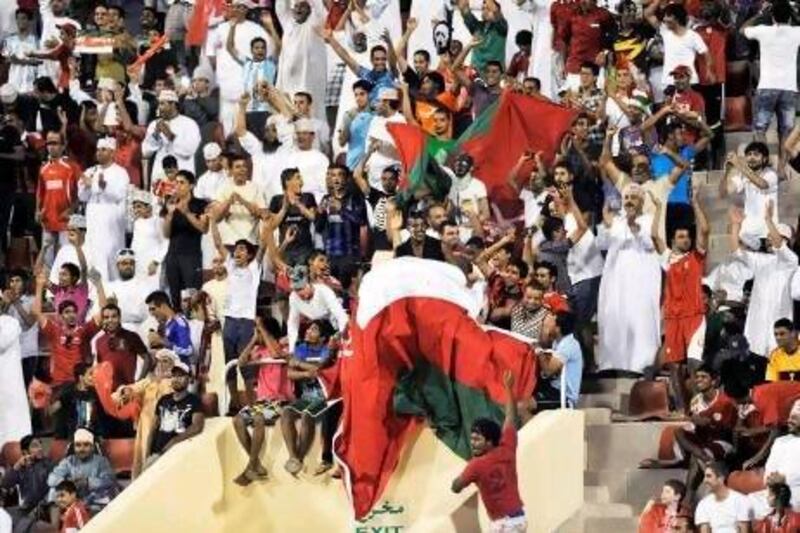The clock had just hit the hour mark, and the match remained scoreless. As Oman prepared to take a corner, their goalkeeper and captain Ali Al Habsi turned to the fans and urged them to make some noise.
The fans responded to their hero with a massive roar. Seconds later, at the other end, Ahmed Mubarak scored from the corner to give Oman the lead in their World Cup qualifier against Jordan.
As the stadium erupted, and Paul Le Guen, his coaching staff and the substitutes wildly celebrated, it summed up a quite wonderful day for Omani football. And one man embodies the team's spirit more than any other.
It is almost impossible to put into words how much Al Habsi means to Omani football fans, indeed to Omanis in general.
As their most high profile player, plying his trade in the English Premier League with Wigan Athletic, he is the most experienced member of the squad, the natural choice for leader. And, when it was most needed, cheerleader as well.
Now, Oman's 2-1 win means they remain in contention to qualify for the 2014 World Cup in Brazil.
How some of the UAE's talented youngsters, who themselves performed heroics at the London Olympics, must wish they could say the same.
Sadly, as the country's youngsters were securing a place in London, the senior squad suffered two early defeats and were eliminated from the World Cup just under three years before it kicks off.
It is easy to forget that when, in November 1989, the UAE golden generation of footballers qualified for their first, and only, World Cup appearance, Oman were still considered the whipping boys of Gulf football. Jordan were hardly any better. But today, both still have their eyes on World Cup.
So why is it that the UAE, not to mention Saudi Arabia, both with considerably more financial resources, can only sit and wonder what might have been?
The answer, once again, can be attributed to Al Habsi and his teammates.
Contributing to, though obviously not entirely the reason, behind the success of Oman's national team in particular is the willingness of many of the top players to play in foreign leagues.
It is not an isolated case. For example, playing abroad has, time and again, proven extraordinarily fruitful some of Africa's best players.
Invariably, the likes of Ivory Coast, Ghana, Morocco and others have benefited from the experience their internationals have picked up in the English Premier League, Spain's Primera Liga, Italy's Serie A and, especially, France's Ligue 1.
Even in Europe, Scandinavian countries have consistently punched above their weight thanks to the exploits of their players all over the continent.
It is a trend that has served Oman well. Seven of players involved with the squad last night currently play abroad; six of them in the GCC.
Imad Al Hosni of Jeddah's Al Ahli, who ran the Jordanian defence ragged last night, had also played for R Charleroi in Belgium. And then there is Al Habsi, of course.
Four Jordanians also play for Saudi and Qatari clubs.
In contrast, every single UAE player called up to the recent squad for the friendly match against Uzbekistan plays at home.
Indeed, Hamdan Al Kamali's six-month stint with Lyon in France remains the sum total of experience that Emirati players have logged in top European leagues.
Incidentally, Saudi Arabia, the former Asian powerhouse and themselves embarrassingly out of contention, have only one player playing overseas, their captain Osama Hawsawi with Anderlecht in Belgium.
Of course, the UAE can claim a stronger domestic league. Oman lacks such financial muscle to attract top quality players to their leagues.
And while a middle ground would seem to be the obvious solution, The Pro League has so far succeeded in attracting more and more foreign players without exporting any.
At the final whistle, the Jordanian players surrounded Al Habsi, wanting to exchange shirts.
The Oman captain then walked to all corners of the ground to salute the 26, 500 capacity crowd. In that moment, you could just about make out his value to his country. Priceless.
Follow us
[ @SprtNationalUAE ]





